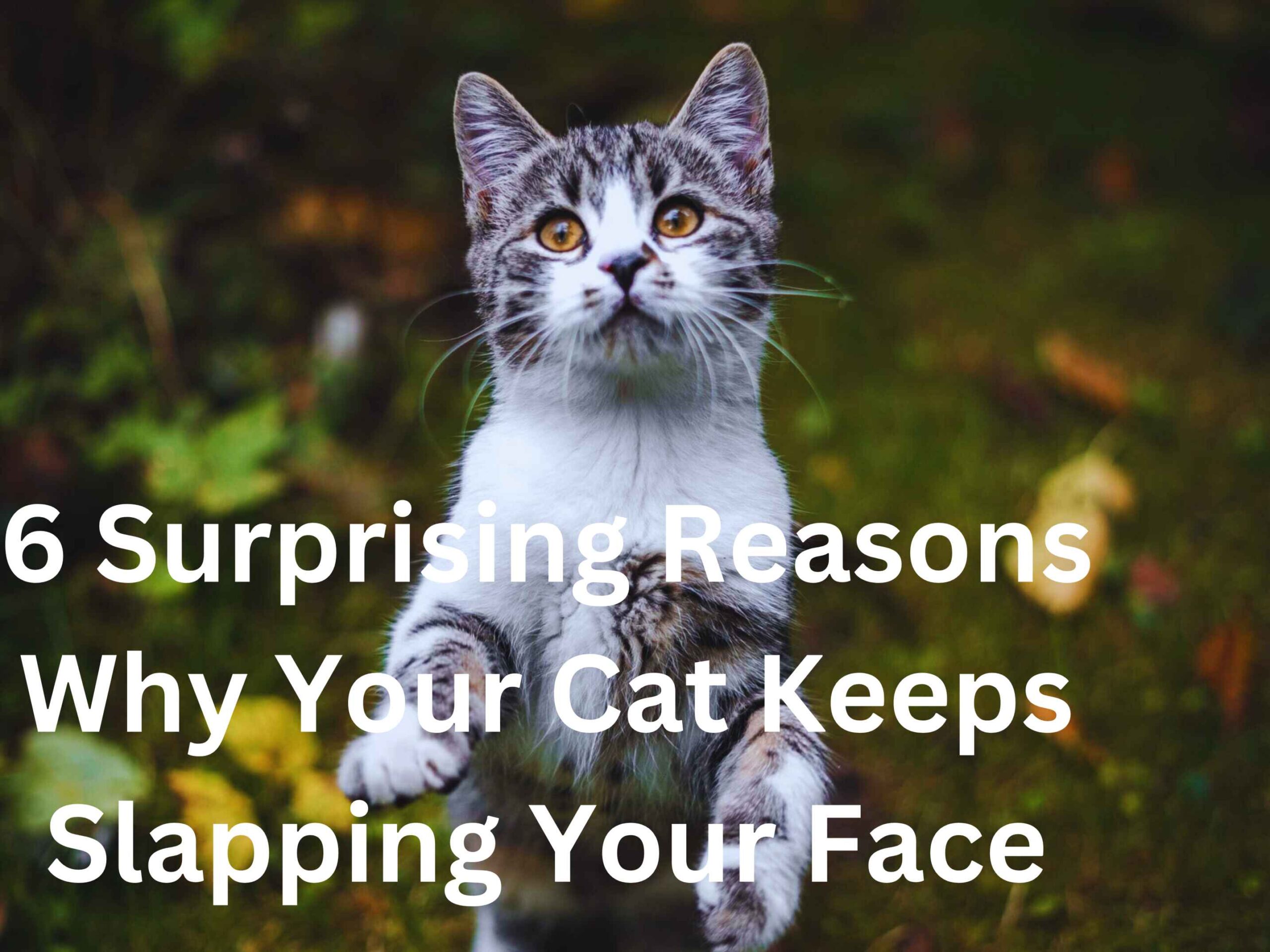Introduction
Have you ever found yourself on the receiving end of a swift paw to the face from your beloved feline friend? It’s a puzzling and often painful experience that many cat owners have encountered.
While we may be quick to dismiss it as mere playfulness or aggression. There are actually some surprising reasons behind this behavior.
In this article, we’ll delve into the six unexpected factors that could be causing your cat to deliver those unexpected facial slaps. Shedding light on their mysterious ways and helping you better understand and navigate your feline-human relationship.
Understanding your cat’s behavior
Understanding your cat’s behavior can be quite a puzzling ordeal. Especially when it comes to the seemingly bizarre act of a cat slap on the face. Contrary to popular belief, this action is not necessarily a sign of aggression.
Cats often communicate using physical gestures, and slapping may simply be their way of getting attention or expressing frustration. It’s important to consider the context and body language accompanying the behavior to decipher its true meaning.
Curiosity drives much of a cat’s actions, and slapping could also be an instinctual response to something unfamiliar. Such as sudden movements or unexpected sounds.
Additionally, cats have their unique personalities. And some may use slapping as a playful interaction or as a means of establishing boundaries.
Understanding that cats have nuanced ways of communicating through their behaviors allows us to foster better relationships with our feline friends. And appreciate the complexity behind their seemingly enigmatic actions.
Can Cats Sense Your Pain? The Truth About Feline Empathy
Asserting dominance and boundaries
One astonishing animal behavior that many cat owners may be familiar with is the act of slapping their faces. Asserting dominance and boundaries, sheds light on this peculiar feline behavior.
Cats, as independent creatures, often use physical gestures like slapping to establish dominance and mark their territory.
When a cat feels its territory or personal space is being encroached upon. It resorts to assertive actions such as slapping to communicate its need for personal boundaries.
Understanding this behavior can help cat owners better interpret and respect their pet’s signals. It also highlights the importance of providing cats with designated spaces where they feel safe and in control.
By acknowledging and validating their territorial instincts, cat owners can create a harmonious environment that supports both the pet’s need for autonomy and the owner’s desire for companionship.
This aspect of asserting dominance serves as a fascinating insight into the intricate world of feline communication and social dynamics.
Why Do Cats Slap? (Why Do Cats Hit You?)
Seeking attention and playfulness

Cats are natural attention-seekers, and when they slap your face, it could be their way of trying to engage with you.
They might be seeking your undivided attention or simply looking for an interactive playtime.
Cats have a playful nature, and in their world, a gentle slap on the face might be seen as a form of initiating a game or seeking some entertainment.
Observing your cat’s body language before the slapping incident can provide valuable insights into their intentions. If their tail is curved and ears are perked up, they might just be in the mood for some fun interaction.
Engaging in interactive play sessions with toys can help channel their playful energy and minimize these attention-seeking slaps.
Understanding that this behavior stems from their need for interaction can deepen the bond between you and your feline friend.
Communicating discomfort or fear
When your cat keeps slapping your face, it might be their way of expressing discomfort or fear. Cats are highly sensitive animals, and they communicate using body language and behavior.
If your cat is feeling unhappy or anxious, they may resort to physical actions like slapping as a means of communication.
It’s important to pay attention to other signs of stress in your cat, such as flattened ears, dilated pupils, or excessive grooming, which can help you understand the underlying cause of their behavior.
Furthermore, cats may also slap when they feel threatened or cornered. In these situations, slapping serves as a form of defense mechanism.
It’s essential to create a safe environment for your cat and provide them with places to retreat to when they feel overwhelmed.
Understanding the reasons behind their slapping behavior can help you address any underlying issues and improve the relationship between you and your feline companion.
Redirected aggression
Cats are known for their independent and sometimes unpredictable nature, and redirected aggression is no exception.
When a cat becomes frustrated or agitated by something it can’t access or interact with – like the neighbor’s cat outside the window or a tantalizing bird on the other side of the glass – they may redirect that frustration onto their owner.
This behavior can manifest as slapping, biting, or other aggressive actions, leaving owners puzzled as to what triggered such a reaction.
It’s important to understand that redirected aggression is not a sign of malicious intent from your feline friend. Instead, it’s an instinctual response to frustration and perceived threats.
As a pet owner, recognizing the signs of redirected aggression and providing appropriate outlets for your cat’s energy and curiosity can help mitigate this behavior.
Creating enriching indoor environments with plenty of interactive toys and engaging activities can help redirect their attention away from potential triggers, ultimately fostering a more harmonious relationship between you and your furry companion.
Medical issues or pain
Medical issues or pain could be another reason why your cat keeps slapping your face. Cats, like humans, can experience various health problems that may cause discomfort or pain. If your cat is in pain, they may act out by swatting at you as a way of expressing their discomfort.
It’s important to pay attention to any changes in your cat’s behavior and seek veterinary advice if you suspect they might be in pain.
Additionally, certain medical conditions such as arthritis or dental issues could make it uncomfortable for the cat to be touched or approached, leading them to respond defensively with slapping.
Observing any signs of discomfort or unusual behavior and seeking proper medical treatment for your feline companion is crucial in addressing this issue.
Conclusion: Understanding and resolving the behavior
In conclusion, understanding and resolving your cat’s face-slapping behavior requires patience, observation, and empathy. It’s crucial to realize that a cat’s actions are often driven by instinct or past experiences.
By observing the circumstances surrounding the slapping incidents, you can gain valuable insights into your cat’s motives and triggers.
Additionally, taking steps to create a stress-free environment for your feline friend can go a long way in addressing behavioral issues.
Resolving the behavior involves positive reinforcement and redirecting their energy towards appropriate activities.
Providing them with engaging toys, enrichment activities, and regular interactive playtime can help channel their energy and reduce aggressive tendencies.
Remember that each cat is unique, so it may take time to figure out what works best for your specific feline companion.
Above all, maintain a bond of trust with your cat through love and understanding as you work towards fostering positive changes in their behavior.
FAQs
Q: Why does my cat keep slapping my face?
A: Cats may slap your face as a sign of playfulness or to get your attention.
Q: Is it normal for a cat to slap its owner’s face?
A: Yes, some cats use slapping as a way to communicate or interact with their owners.
Q: What should I do if my cat keeps slapping my face?
A: You can redirect the behavior by providing interactive toys or engaging in playtime with your cat.
Q: Could there be an underlying health issue causing my cat to slap my face?
A: It’s unlikely, but if you’re concerned, consult with a veterinarian to rule out any medical issues.
Q: Can training help reduce my cat’s slapping behavior?
A: Yes, positive reinforcement training methods can help modify your cat’s behavior.
Q: Should I punish my cat for slapping my face?
A: No, punishment can lead to fear and aggression in cats. Instead, focus on positive reinforcement and redirection.
